The Lived Experience of FTD: The Challenges of July Fourth

The following article was written by former Persons with FTD Advisory Council member Cindy Odell. The Council works to ensure the voice of people living with FTD guides AFTD as it works towards a future free from FTD; you can learn more about the Council and current members on AFTD’s website.
What an exciting time of year—fireworks, bright lights, loud music, and large groups of people. July Fourth can be exhilarating, but it can also be devastating to individuals like myself, diagnosed with FTD or other cognitive disorders.
First, resist the impulse to skip it. Even with the limitations of FTD, July Fourth can be an enjoyable and meaningful occasion, if approached thoughtfully. Identify in advance those areas that are likely to have a negative impact and establish a plan of action.
Late Night Celebrations
Caregivers should discuss plans ahead of time to learn their loved one’s preferences. One option is to rest or even sleep during the day and plan to wake at the time of the celebration. Another option is to avoid a late night altogether, and have a celebration earlier in the day.
Bright Lights and Loud Noises
Group Size
Interaction and Education
Finally, if attending a July Fourth parade, barbeque, or fireworks isn’t possible, spend some time discussing memories of past Independence Day celebrations and what they meant to you and your family.Happy Fourth of July!
By Category
Our Newsletters
Stay Informed
Sign up now and stay on top of the latest with our newsletter, event alerts, and more…

